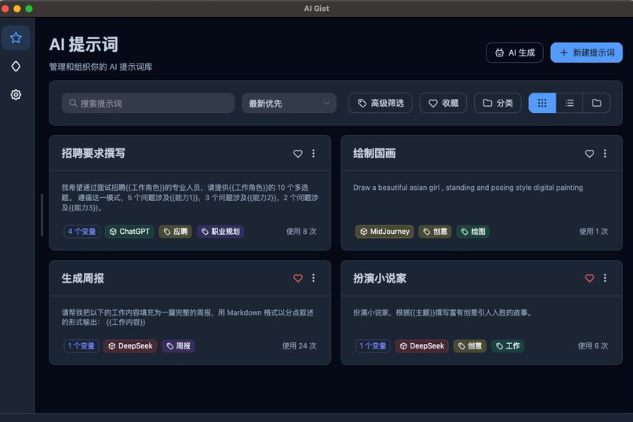With the widespread application of generative AI, prompt management has become a key aspect for developers to improve efficiency. According to AIbase, which recently gathered information from the internet, an open-source AI prompt management tool called AI Gist has quickly gained popularity. Its powerful variable replacement, Jinja template support, and multilingual features provide developers with an efficient and convenient prompt management experience. Below, AIbase will deeply analyze the core functions and application value of AI Gist.
Intelligent Prompt Management Simplifies the Development Process
AI Gist is an open-source prompt management tool designed specifically for AI developers, aiming to optimize the creation and management process of prompts for large language models (LLMs). The tool supports variable replacement and Jinja templates, allowing users to generate flexible prompts through dynamic templates, greatly simplifying the writing and debugging of complex prompts. AIbase learned that since its release in July 2025, AI Gist has already received over 100 GitHub stars and more than 1,200 downloads within just two weeks, showing that it effectively addresses the core pain points of developers.

With AI Gist, users can easily save, edit, and reuse prompts, supporting multiple management methods such as card view, table view, and category view. Developers can organize prompts finely according to project needs using features like tags, categories, and ratings, ensuring quick access and retrieval of required content. This multi-view management design is especially suitable for managing large-scale prompt libraries, improving development efficiency.
Jinja Templates and Variable Filling, Flexible Dynamic Generation
One of the core highlights of AI Gist is its support for Jinja templates. Jinja2, a powerful template engine, allows developers to embed variables using double brackets `{{ }}` or use ` {% %}` control structures to implement conditional logic and loops. For example, developers can create a prompt template such as "Generate a description for {{task_type}} task for {{user_role}}", dynamically filling in specific roles and task types when calling, thus quickly generating customized prompts. This flexibility not only reduces the workload of manual editing but also ensures consistency of prompts across different scenarios.
In addition, AI Gist supports variable filling functionality, allowing users to dynamically input variable values when calling templates. For instance, when generating prompts for a customer service robot, developers can insert user names or specific questions via variables to generate personalized interaction content. AIbase noticed that this feature is particularly suitable for scenarios requiring frequent adjustments of prompts, such as chatbot development, content generation, and data analysis.
AI Optimization and Cloud Backup, Supporting Efficient Iteration
AI Gist not only provides manual prompt management, but also integrates AI-generated and optimized functions. Developers can use built-in AI algorithms to generate prompts automatically, or optimize existing prompts to ensure the output better meets model requirements. For example, AI Gist can recommend clearer and more efficient prompt structures based on the user's input task description, significantly improving the quality of model outputs.
To ensure data security and cross-device collaboration, AI Gist supports cloud backup, allowing users to synchronize their prompt library to the cloud for access and editing anytime, anywhere. Additionally, the tool offers a history record function, tracking each modification and usage of prompts, helping developers trace the iteration process and quickly revert to the best version.
Multilingual Support, Empowering Global Developers
The multilingual support of AI Gist further expands its application scenarios. Currently, the tool supports multiple languages including Simplified Chinese, Traditional Chinese, English, and Japanese, enabling seamless switching between the interface and prompt management. This is particularly friendly for teams developing AI applications in multilingual environments, such as developing multilingual customer service robots or multinational marketing content generation tools. AIbase believes that this feature will help AI Gist attract more attention from global developers.
Open Source Community Driven, Continuous Iteration and Upgrades
As an open-source tool, AI Gist is released on GitHub under the Apache 2.0 license, allowing developers to freely modify and expand it. According to community feedback, the development team has been actively responding to user needs, recently adding a shortcut key calling feature to further improve operational efficiency. In the future, the team plans to optimize the AI generation algorithm, add more template types, and support local deployment to meet the needs of enterprise users.
For users who want to try AI Gist, they just need to visit the GitHub repository to download the installation package and configure the API key to use all features. Whether for individual developers or team collaboration, AI Gist can provide an efficient and flexible prompt management experience.
Future Trends in Prompt Management
The launch of AI Gist marks the entry of AI prompt management into an intelligent and systematic stage. Its innovative design combining Jinja templates, AI optimization, and multilingual support not only lowers the development threshold but also provides strong support for rapid iteration of complex AI projects. AIbase predicts that as the application of generative AI deepens, tools like AI Gist will play an increasingly important role in the developer community, helping AI technology be widely applied.
Conclusion
With its powerful features and open-source nature, AI Gist is becoming an indispensable assistant for AI developers. Whether it's simplifying prompt management, optimizing generation results, or supporting multilingual development, this tool demonstrates great potential.
